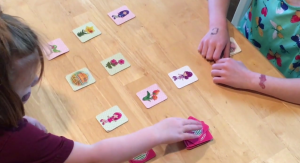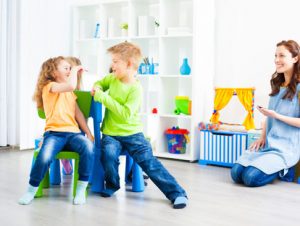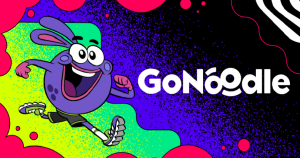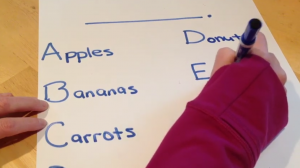Increasing communication is the ultimate goal when working with our autistic learners. Learning through play is a huge game changer for all preschool and elementary aged students, and especially for our youngest autistic learners. When we modify the play and increase the social skills, our young autistic learners begin to make huge strides in their social communication and leisure repertoires. All of the activities below are so much fun and work for autistic learners that are communicating verbally, with AAC devices, sign language or not yet verbally communicating. When taking the time to modify different games to play and build social skills in preschool and elementary age students, the progress is inevitable and so much fun to watch! Take a look at the top 5 modified play and social skills activities for our youngest autistic learners right now!
- Modified Matching!
Matching games have been around forever! They are easily accessible, come in a variety of themes or characters and are tremendously easy to modify for our autistic learners. Even preschool aged students can easily participate in this game too! Autistic learners that are not yet communicating verbally can participate, as well as students that are holding conversations, which makes this great for mixed group sessions.
The modifications are pretty simple. First, start with 4-5 matches only. The deck can come with a bunch and we don’t need the game to be overwhelming or take an hour! Take the 4-5 matches you want to use and separate them into two piles. One will be face down and the other cards will be visible to the group of students. When you flip over one of the match cards from the deck, students can find the match! Taking turns using the match cards helps to build those social skills and identifying different vocabulary is an awesome language building activity. Choose a deck that students will enjoy like Disney themed, or print off your own cards and make the activity related to your theme! For a video tutorial, check out this YouTube video from ABA Speech here!

- Simon Says!
Next up is modified Simon Says! This classic game is not only interactive, but gets our kids up and moving to build those gross motor skills, as well as social skills and leisure skills. The modification is that we always use Simon Says. The game still focuses on listening to directions, but without the “gotcha” aspect. This is a great game to help our autistic learners with following directions, working on social skills like saying, “Good morning!” or to get kids up and moving with a twist or a jump! Imitation skills are great for building up our autistic learners’ social skills and working through Simon Says also encourages cooperative groupings. Other modifications, if needed could be using visuals for students to see the direction or giving the students a list of directions Simon could say prior to playing.

- Musical Chairs!
Another great game to get those gross motor skills working along with social skills is modified musical chairs. We modify this game by NOT taking away a chair when the music stops. Having students sit when the song stops is a fun way to build those social skills. Even better, you can choose popular songs or choose a song that matches the theme you are working with now!

4. GoNoodle
GoNoodle is a super fun website for brain breaks. GoNoodle can be projected on a Smart Board, students can choose which video they want to watch and all of the videos are engaging and exciting. Some have dances to follow and that builds those social imitation skills! Our autistic learners will be working cooperatively and most of all having fun!

- Grocery Store Game!
This game is so much fun and builds those social skills, has students working cooperatively, and is great for students using AAC devices, sign language, or even visuals. The game uses the alphabet and has each student start with the line, “I’m going to the grocery store and I am going to buy…” Each child adds an item from the grocery store that starts with a letter of the alphabet. The first individual would say “I’m going to the grocery store and I am going to buy an apple!” Then someone might say, “I’m going to the grocery store and I am going to buy bacon!” The game continues from there. If students struggle, provide visuals of real life items a grocery store would offer. You can write down the items students say on a white board, or chart paper! If you are looking for a more detailed description and a YouTube demonstration, check out this link on ABA Speech!

Working with preschool and elementary age autistic learners is so rewarding. Play, leisure, and social skills are of utmost importance for our littlest learners. Playing games and learning through play has been proven successful over and over again! Remember games can be simple too! You could simply play would you rather, or practice identifying emotions with cards to make it game like! Take some time to really build that repertoire of social skills. Using these 5 modified play social skill activities will definitely be a fun and engaging experience!

0 Comments